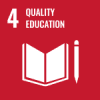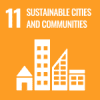The Ministry of Research, Technology and Higher Education (RISTEKDIKTI) encourages universities to conduct research that provides tangible results for the society and industry.
Director of Research and Community Service RISTEKDIKTI, Prof. Dr. Ocky Karna Radjasa, said that community service programs can serve as a place to implement research.
“Implementation does not always end in industry or commercialization. We have committed that research cannot be separated from community service,” he said in the Workshop on Restoration of Community Service as a Concept of Higher Education Development and Contribution to Society on Wednesday (4/9) at the UGM Senate Hall.
In the context of the Tri Dharma of Higher Education, community service activities are no less important when compared to education and research activities. Therefore, the portion of attention given to the development of community service activities should be the same as the other two “dharmas”.
In the meeting organized by the UGM Academic Senate, he explained the basic principles of community service, which include synergy, multi-discipline, and collaboration, structured with clear output targets, according to the needs or challenges in society, as well as sustainable, thorough, and meaningful.
Referring to the Higher Education national standards in community service, according to him, UGM is one of the state universities that have met these performance standards well.
“UGM is already on the right track. If higher education applies national standards, the output will be good,” he said.
The Student Community Service Program (KKN-PPM), he explained, aims to increase empathy and awareness for vulnerable communities, and to apply science and technology in teamwork and multidisciplinary ways.
In addition, KKN-PPM serves to instill personality values in the form of nationalism and the spirit of Pancasila, tenacity, work ethic, and responsibility, as well as independence, leadership, and entrepreneurship.
This workshop was held as a forum to rethink UGM KKN policies, including strengthening perceptions of KKN, improving the management of KKN implementation, developing a sustainable KKN model while still holding to UGM values and looking for alternative models of KKN standardization of quality management system.
“Darma service must strengthen UGM identity as a university of struggle, culture, community, Pancasila, and nation,” said a member of the UGM Academic Senate, Research and Community Service Commission, Prof. Dr. Suratman.
KKN has been developed over a long period of time, starting from the initiation of the mobilization of students outside Java in 1951-1962. The KKN-PPM program, said Suratman, is a challenge as well as an opportunity for students. According to him, the KKN-PPM concept can provide entrepreneurial creative space for students with risk minimization, and can give inspiration for future leaders. It can also build resilience and independence as well as students’ critical thinking ability in solving problems in the community.
KKN-PPM is also considered to be an attractive learning tool for the international academic community. The involvement of foreign students from various foreign universities is an internationalization of KKN-PPM for global education.
“We want to turn UGM to be a world reference,” he said.
Source: https://ugm.ac.id/id/berita/18391-pengabdian-masyarakat-menjadi-salah-satu-bentuk-hilirisasi-riset



